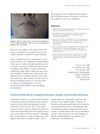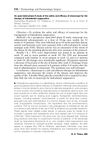 February 2024 in “Curēus”
February 2024 in “Curēus” A balanced diet with proteins, vitamins, and minerals is crucial for managing skin disorders.

Many women with PCOS in Saudi Arabia suffer from depression and anxiety.
 August 2023 in “Clinical, Cosmetic and Investigational Dermatology”
August 2023 in “Clinical, Cosmetic and Investigational Dermatology” Research on the human skin microbiome has grown, focusing on skin health and diseases, with more studies needed on antibiotic resistance and AI applications.
November 2021 in “Transplantation direct” A 68-year-old man improved after being correctly diagnosed and treated for a skin condition caused by mites, following a stem cell transplant.
December 2017 in “Journal of pediatric surgery case reports” A toddler with a rare adrenal gland tumor causing male-like physical changes was successfully treated with surgery.
62 citations,
July 2013 in “American Journal of Clinical Dermatology” Alopecia areata patients have higher oxidative stress and lower antioxidant levels.
1 citations,
July 2021 in “Acta dermatovenerologica Croatica” Adalimumab significantly improved symptoms and quality of life in two patients with Hidradenitis Suppurativa.
73 citations,
October 1986 in “Journal of the American Academy of Dermatology” Tretinoin may help hair growth and works better when combined with minoxidil.
 13 citations,
April 2019 in “Actas Dermo-Sifiliográficas”
13 citations,
April 2019 in “Actas Dermo-Sifiliográficas” Vitamin D is important for skin health, but more research is needed to understand its full effects and treatment potential.

PRP therapy effectively treats hair loss, wrinkles, scars, ulcers, and skin pigmentation disorders.
18 citations,
July 2016 in “Clinics in dermatology” Nutrition affects skin health differently based on age and condition.
17 citations,
November 2021 in “Journal of Cosmetic Dermatology” Combination therapies for androgenetic alopecia work best but can have significant side effects and costs.
 4 citations,
December 2022 in “International Journal of Molecular Sciences”
4 citations,
December 2022 in “International Journal of Molecular Sciences” Zinc is crucial for skin health and treating various skin disorders.
3 citations,
April 2022 in “Biomolecules” Higher miR-34a levels and the A variant of the MIR-34A gene are linked to increased risk and severity of alopecia areata.
1 citations,
February 2024 in “Pharmaceutics” Nanovesicles improve drug delivery through the skin, offering better treatment outcomes and fewer side effects.
 March 2024 in “International journal of nanomedicine”
March 2024 in “International journal of nanomedicine” Polymeric nanohydrogels show potential for skin drug delivery but have concerns like toxicity and regulatory hurdles.
 November 2022 in “IntechOpen eBooks”
November 2022 in “IntechOpen eBooks” Hair loss can significantly impact a person's mental health, causing issues like anxiety and depression, and stress can trigger hair loss.
 August 2022 in “Case reports”
August 2022 in “Case reports” Isotretinoin effectively treated a rare scalp condition, but careful drug monitoring and a dairy-free diet were important.
84 citations,
February 2015 in “Experimental Dermatology” PPARγ is crucial for skin health but can have both beneficial and harmful effects.
 26 citations,
February 2011 in “Anais Brasileiros De Dermatologia”
26 citations,
February 2011 in “Anais Brasileiros De Dermatologia” Polycystic Ovary Syndrome can cause hair loss and skin issues, and early treatment is important for preventing complications.
 19 citations,
March 1987 in “International Journal of Dermatology”
19 citations,
March 1987 in “International Journal of Dermatology” A drug called cimetidine can help treat hair loss in women by blocking androgen receptors. However, it's not the first choice and needs more research.
 1 citations,
December 2023 in “npj biofilms and microbiomes”
1 citations,
December 2023 in “npj biofilms and microbiomes” Single-cell engineered biotherapeutics show promise for skin treatment but need more research and trials.

The document is a detailed guide on skin conditions and treatments for dermatologists.
 April 2019 in “Journal of Investigative Dermatology”
April 2019 in “Journal of Investigative Dermatology” Caffeine can protect scalp hair follicles from damage caused by UV radiation.
 49 citations,
November 1992 in “Archives of dermatology”
49 citations,
November 1992 in “Archives of dermatology” Different treatments for alopecia areata have varying success rates and side effects; intralesional steroids are most effective.
 30 citations,
April 1990 in “Clinical Pharmacology & Therapeutics”
30 citations,
April 1990 in “Clinical Pharmacology & Therapeutics” Tretinoin cream boosts minoxidil absorption, possibly improving hair loss treatment.
 9 citations,
November 2013 in “Dermatologic Surgery”
9 citations,
November 2013 in “Dermatologic Surgery” Hair transplant complications were likely due to deep graft placement and rough handling.
 8 citations,
April 1990 in “Hormone and Metabolic Research”
8 citations,
April 1990 in “Hormone and Metabolic Research” The medication combination did not affect glucose tolerance but increased some cholesterol levels due to its estrogen component.

COVID-19 can cause skin problems and affect dermatology treatments, with recommendations for skin care and cautious use of certain drugs.
 January 2009 in “Yearbook of Dermatology and Dermatologic Surgery”
January 2009 in “Yearbook of Dermatology and Dermatologic Surgery” Etanercept is safe and may help improve hidradenitis suppurativa, but more research is needed.




















